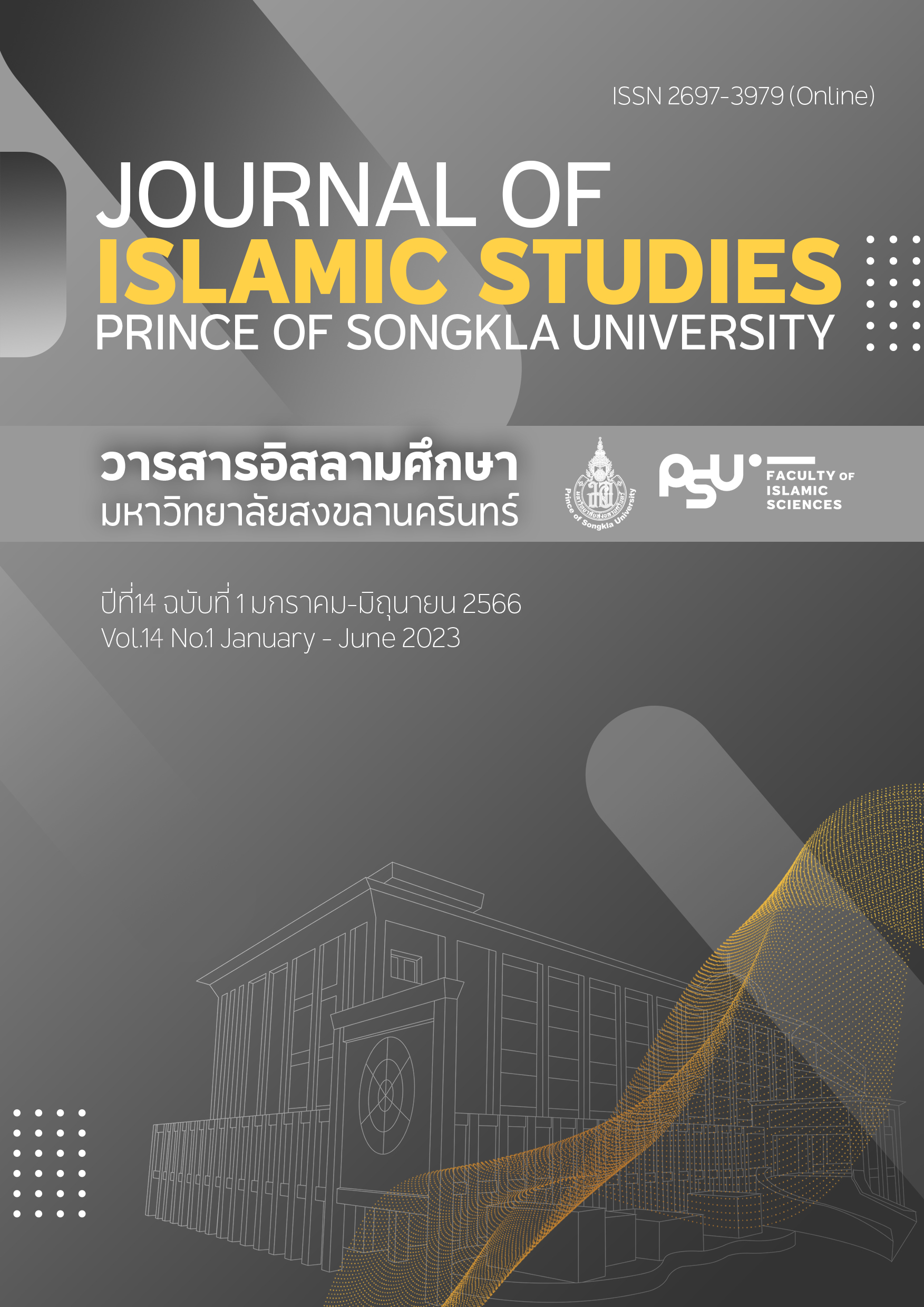[RETRACTED]The Development of a Model to Help and Create a Muslim Identity for Mu'allaf that is Appropriate in the Thai Context of Muslim Organizations in Southern Border Provinces
Keywords:
Muslim Organization, Muslim identity, mu’allaf, Southern Border ProvincesAbstract
Objectives: The objective of this study were: 1) to study the conditions and contexts of Islamic organizations providing assistance and forming the Islamic identity of Muslim reverts in various regions of Thailand; 2) to examine the patterns of Islamic organizations in providing assistance and forming the Islamic identity of Muslim reverts in the southernmost provinces of Thailand; and 3) to develop a model of assistance and identity formation for the Islamic organizations in Thailand’s Deep South.
Methodology: The main informants for data collection were 30 representatives from 10 Muslim organizations. The research tools were in-depth interviews and a meeting of experts and experts to listen to opinions, suggestions, and check suitability and the practical feasibility of implementing the pattern. Qualitative data analysis using content analysis based on an in-depth interview framework to answer research objectives.
Research Findings: 1. Emerging Muslim organizations in Thailand contributed to diverse patterns of mu’allaf assistance and Islamic identity formation depending on the organization’s missions. They were the following: 1) the Santichon Foundation focuses on providing knowledge and consultation, addressing mu’allafs concerns, disseminating Islamic knowledge through online media, and financially supporting Islamic activities; 2) the Human Mercy Foundation focuses on providing basic livelihood essentials: shelters, foods, clothes, etc; and promoting Islamic identity through teaching, training, and knowledge-building about the fundamental principles and practices of Islam; 3) the Foundation for Education and Development of Muslims in Northeast Thailand emphasizes providing education and knowledge in forming Islamic identity, promoting cooperation among Muslims in the northeastern region and internationally, and developing human resources through activities such as teaching Islam and organizing summer camps for Muslim youth 2. Islamic organizations in the Deep Southern Border Provinces of Thailand reported their patterns of assistance and identity-forming practices for mu’allafs including issuing Islamic faith certificates, organizing Islamic education programs, Quran reading training, distributing Zakat and donations, establishing mu’allaf funds, and promoting vocational skills and basic livelihood factors 3. The organizational model contextually suitable for assisting and forming Islamic identity among mu’allafs in Thailand's Deep Southern Border Provinces was identified as the "Al-'Irshad Model," comprising six components: Al (Al-Quran) referring to providing Qur’an reading training; I (Ilmu) referring to organizing Islamic education programs; R (Rizki) referring to promoting vocational skills and basic livelihood factors; Sh (Shahadah) referring to issuing Islamic faith certificates; A (Alms) referring to distributing Zakat (alms) and donations; and D (Sunduk) referring to establishing Islamic funds.
Contribution: 1) Conducting annual surveys by the Provincial Islamic Commission Office in the Deep Southern Border Provinces is recommended to ascertain mosque numbers and the size of associated mu’allaf populations. Continuous educational initiatives should be emphasized for a comprehensive understanding of Islamic principles. Additionally, fostering opportunities for meaningful interactions and knowledge exchange among mu’allafs is a priority 2) It is advisable to establish dedicated Islamic centers to support and foster Islamic identity among mu’allaf communities. District-level Islamic associations, supervised by the Provincial Islamic Commission, can manage and oversee these centers. It’s also crucial to ensure contextual appropriateness and alignment with local needs in establishing and operating these centers 3) Encouraging the formation of cohesive mu’allaf groups and facilitating the cultivation of strong relationships within their communities are important. Moreover, organizing targeted activities to enhance their vocational skills and livelihood opportunities will contribute to their overall well-being and empowerment 4) It is vital to cultivate harmonious relations between mu’allafs and mosques by prioritizing religious education and community engagement. Strengthen the relationship by promoting a sense of belonging and involvement within the Muslim community.
References
Binlateh, W., & Thongchuay, C. (2010). The Processes of Sustaining Muslim Identities and Strong Community Building: The Case Study of Ban Nua Mosque. AL-NUR Journal of Graduate School, Fatoni University. 5(9), 55-66. https://so01.tci-thaijo.org/index.php/NUR_YIU/article/ view/1093/857
Nong Chok District Mosque Administrator Club Bangkok. (2012). Guide to Muallaf (New Muslims) (18thed). Nong Chok District Mosque Administrators Club.
Noomsuk, A. (2016). Islamic Da'wah in the context of Thai Society: Muallafs training Program regular mosque. Muslim News. 31 January 2016.
O-Ramlong, T. (2014). Da‘awah Methodology of Santichon Muslim Foundation to New Convert Muslims. [Master’s thesis] Prince of Songkla University.
Plodpluang, U. (2013). Data Analysis in Phenomenology Studies. Nursing Journal of The Ministry of Public Health, 23(2), 1-10.
Qaradawiy, Y. (2006). Fig al-Zakāh. Maktabah Whabāh.
Salae, H. (2007). Transnational Muslim organizations and human security : a case study of international islamic relief organization of Saudi Arabia in Thailand. [Master’s thesis] Chulalongkorn University.
Sohsan, J. Apichatvullop, Y. Thongyou, M. (2008). Nur-Al-Iman Islamic Mosque Community and The Construction of Muslim Community in the Pluralistic Society of Isan. Journal of Mekong Societies. 4(1),53-92.
Southern border Provinces Group. (2018). Southern border Provinces Development Plan 2019-2021. Group of Strategic Management of Southern Border Provinces.
Sungkharat, U., & Taweeburut, T. (2015). Tourism management based identity and way of life in ecotourism location the south of Thailand. [ Master’s thesis] Prince of Songkla University.
Tho-Ard, M. (2012). Muallaf’s Learning and Communicating of Muslim Identity in the Rural and Urban Areas of Thailand. [Master’s thesis] Dhurakij Pundit University.
Wali, S., Asmail, A., Uma, A., & Azizskul, H. (2021). Model of learning and innovation in community economy using masjid as a base a base in Pattani Province. [Research report] Program Management Unit on Area Based Development (PMU A).
Downloads
Published
How to Cite
Issue
Section
License
Copyright (c) 2023 Journal of Islamic Studies, Prince of Songkla University

This work is licensed under a Creative Commons Attribution 4.0 International License.
All articles Published in The Journal of Islamic Studies are author’s opinions, and not the responsibility of the Faculty of Islamic Sciences nor the editorial board. However any citation should be referred to the journal.
















